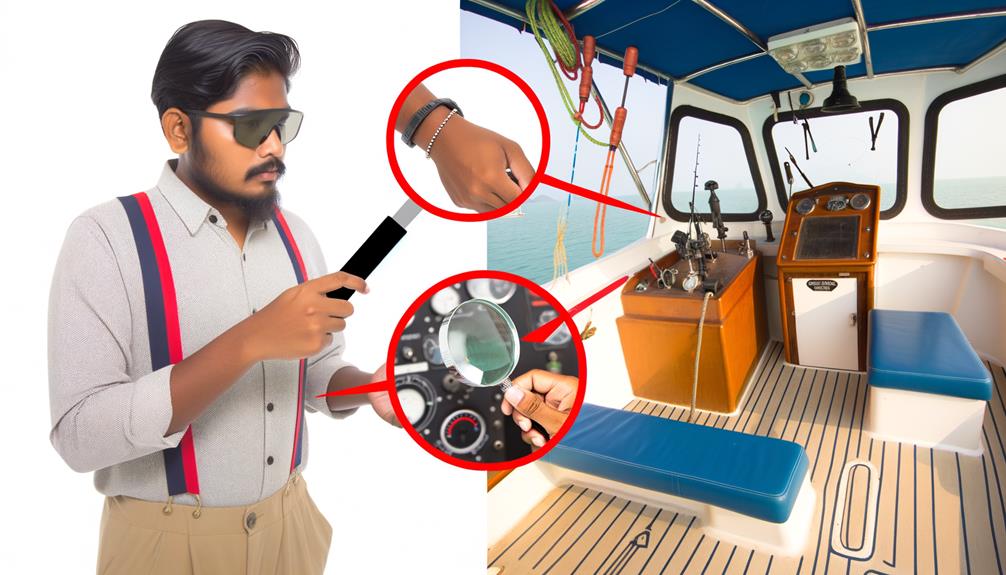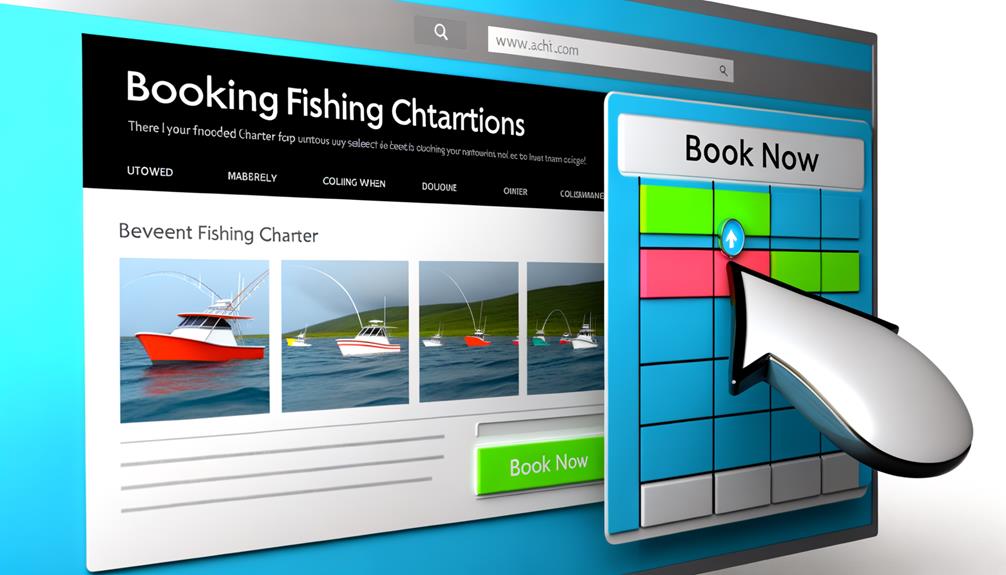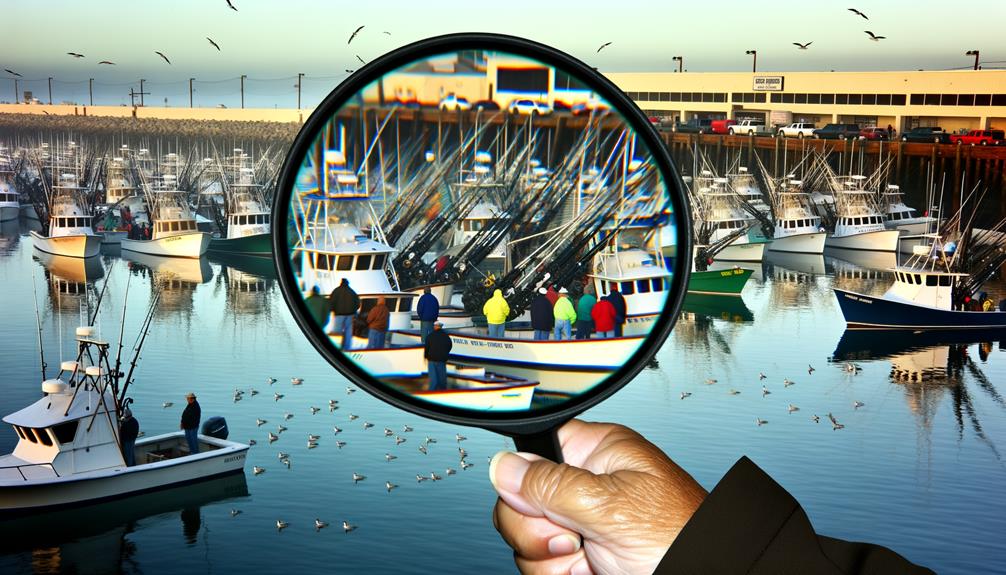Gone are the days when you could just hitch a ride on the nearest trawler and call it a fishing trip. Nowadays, choosing the right fishing charter isn't just about casting a line and hoping for the best. You've got to weigh up a whole catch of considerations like the type of fishing you're after, the charter's reputation, the captain's experience, and even the fine print on licenses and cancellation policies.
It's a lot to take in, I know, but don't let that put you off. In fact, what if I told you that making the right choice could be the difference between a good fishing trip and an unforgettable one?
Key Takeaways
- Research the captain's experience, read fishing reports, and customer reviews.
- Understand what is included in the price and if any permits or licenses are needed.
- Evaluate the captain's experience and knowledge of local waters.
- Choose a fishing charter that aligns with your skill level, budget, and desired location.
Understanding Fishing Charters
To truly maximize your angling adventures, it's crucial to understand what fishing charters are, their purpose and goals, and how they cater to different skill levels with varying prices based on location and duration. A fishing charter is a service provided by a charter boat, essentially a floating fishing guide, supervised by an experienced charter captain. The type of charter you choose, whether it be shared or private, inshore or offshore, will directly affect your charter trip experience.
Choosing the right fishing charter involves careful consideration of your skill level, budget, and desired fishing location. The best fishing charter for you provides an appropriate challenge, ensuring you're neither out of your depth nor bored. Prices can vary, with nearshore trips usually cheaper than offshore adventures.
When choosing a charter service, research is key. Look into the charter captain's experience, read fishing reports and customer reviews. Understanding fishing charters also means knowing what's included in the price, whether permits or licenses are needed, and communicating with the charter service beforehand. This will help you choose a fishing charter that suits you best, enhancing your angling journey.
Selecting Your Fishing Experience
Having grasped the basics of fishing charters, let's now focus on tailoring your fishing experience to your skill level, budget, and preferences. Choosing the right fishing charter is a crucial step towards crafting that memorable fishing experience.
A key factor to consider is the type of fishing you're interested in. Do you prefer offshore deep-sea fishing, or would you rather immerse yourself in local fishing culture by staying close to the shore? The right boat and experienced captain can cater to your preferences.
In selecting your fishing experience, consider the following:
- *Shared or private charters*: Shared charters are budget-friendly and offer camaraderie, while private charters provide a more personalized experience.
- *The captain's experience*: An experienced captain knows the local waters and understands different fishing techniques.
- *Permits and licenses*: Ensure the charter boats have the right licenses and the captain has a good reputation.
- *Communication*: Speak to the captain before you book. Discuss the type of fishing you'd like to do and the tackle and techniques offered.
Evaluating Charter Services

When choosing a fishing charter, it's crucial to evaluate the service thoroughly.
Not only should you assess the affordability of the charter, but also consider the quality and suitability of the fishing equipment provided.
A careful examination can help ensure a fishing experience that's worth every penny.
Assessing Charter Affordability
Before diving headfirst into booking a fishing charter, it's crucial to carefully assess the total cost, including any additional fees for licenses, permits, and gratuities. Don't be lured in if the price of a charter seems surprisingly low; the least expensive option may not always be the best choice. When assessing charter affordability, consider these tips for choosing:
- Compare the services and amenities offered by different charter fishing operators.
- Pay attention to the charter captain's reputation and experience.
- Evaluate the pricing structure and any discounts for group bookings or off-peak times.
- Inquire about payment options, deposit to secure the trip, and refund policies.
Examining Fishing Equipment
Now, let's delve into the importance of examining the fishing equipment and evaluating the services provided by the charter. When choosing a fishing charter, the captain's expertise and the quality of the boat are critical. So is the fishing equipment. Make sure it's in top-notch condition and suitable for the type of fish you're aiming to catch.
Ask about their fishing license and catch and release policies. It's also helpful to scrutinize customer reviews and fishing reports. Communication with the captain before booking is key. You'll want a clear understanding of what your fishing trip will entail, especially if you're venturing into deep sea fishing.
| Consideration | Why It Matters |
|---|---|
| Captain's Expertise | A seasoned captain ensures a safe and successful trip |
| Boat Quality | A well-maintained boat reflects the quality of the charter |
| Fishing Equipment | Suitable, quality equipment increases chances of a good catch |
| License & Policies | Understanding these ensures legal and ethical fishing |
| Reviews & Reports | These provide insight into past customer experiences |
Communicating With the Captain
Don't underestimate the importance of communication with your charter captain.
This is your chance to align your fishing preferences, discuss tackle requirements, and understand the captain's expertise.
Strive for a discussion that establishes common expectations, ensuring a successful fishing trip.
Understanding Captain's Expertise
To ensure a memorable fishing adventure, it's crucial to evaluate your charter captain's expertise in the specific fishing techniques you're interested in. When you choose a charter, don't hesitate to ask the captain about their experience and captains license.
Take the time to:
- Ask the captain about their experience with the fishing techniques you're interested in.
- Verify the availability of specific equipment on board.
- Let the captain know ahead about any specific fishing goals you have.
- Gauge the captain's attitude and enthusiasm as it can enhance your experience.
Establishing Common Expectations
Before you book your fishing charter, it's essential that you communicate clearly with the captain to establish common expectations and align your fishing goals. This is a critical step in how to choose a fishing charter.
It's not merely about wanting to catch some fish; it's about the type of trip and style of fishing you desire.
So, make sure to discuss all aspects, from preferred fishing techniques to catch and release policies. Ensure the captain or guide's experience, expertise, and enthusiasm match what you're seeking.
Booking Your Charter

When you're ready to book your fishing charter, it's crucial to thoroughly research different services, taking into account the captain's expertise, customer reviews, fishing reports, and the type of boat utilized. This will ensure that you choose a fishing charter that's in line with your needs and expectations.
To make the right charter decision, you'll need to:
- Find out what's included on the day of the charter. Does it cover bait, tackle, and licenses? Knowing this upfront will save you from unpleasant surprises.
- Understand the cancellation policy. Weather can be unpredictable, and you need to know if you can reschedule or find another charter in case of unfavorable conditions.
- Decide between a private charter and shared trips. Shared trips can be cheaper, but a private charter offers a more personalized experience.
- Communicate with the captain before booking your charter. This gives you an opportunity to gauge their knowledge, experience, and to ask any additional questions.
Considerations for Cancellations
Having secured your fishing charter, it's equally critical to get a firm grasp on the cancellation policy, as unforeseen circumstances such as weather or mechanical issues could potentially disrupt your plans. Never book a charter that doesn't clarify these details upfront.
The time you make ahead for your fishing trip could be wasted if you're not prepared for the possibility of cancellations. As Lenny Rudow, a seasoned offshore fishing trips expert, suggests, "If your chosen spot doesn't give you an alternative, seek another date or charter."
Keep in mind that a day of bass fishing could quickly turn sour if you lose sight of land due to bad weather. So, it's best to ask about rescheduling options and any associated fees.
Here's a simple table to help you:
| Questions to Ask | Desired Answers |
|---|---|
| What are the reasons for potential cancellations? | Weather, mechanical issues |
| What are the rescheduling options? | Another date, different charter |
| What are the fees for cancellations? | Minimal to none |
| What is the refund process? | Prompt and transparent |
Being part of the fishing community means looking out for each other. Share this information to help others make informed decisions.
Checking Charters and Guides

Dive deep into your research of charter services, ensuring you scrutinize everything from the captain's experience and expertise to the type of boat used for the charter. This is a crucial step when checking charters and guides. It's not enough to simply select a service that claims to operate as fishing guides, you must take the time to research thoroughly.
Consider these essential points:
- Look into the captains' qualifications and experience. Do they've a solid background in running fishing trips? Are they knowledgeable about the local waters and fish species?
- Read client reviews and fishing reports. What're other anglers saying about their fishing trips? Did they catch fish?
- Check out the Guide Service's reputation. Are they licensed and insured? Do they maintain their equipment and boats properly?
- Finally, observe the type of boat used. Is it suited for the kind of fishing trip you wish to undertake?
Avoiding Common Charter Mistakes
After thoroughly investigating the charters and guides, you're now equipped to sidestep common charter mistakes that can turn a promising fishing trip into a disappointing experience. Even if you don't know much about fishing, understanding how to choose a fishing charter is the first step in your trip to finding the perfect catch.
Avoiding common charter mistakes starts with doing your homework. Impulsive bookings can lead to regrettable outcomes, so take your time. Research and compare services, considering the pros and cons of each option. It's best to ask about specific tackle, techniques, and equipment offered. Don't be swayed by flashy boats; focus on the captain's credentials and reputation.
Communication with the captain is paramount. Do they explain how to choose the right bait, or how to handle the rod? Are they patient and accommodating to novices? You might be able to learn a lot and even make new fishing buddies among the crew members. Remember, you're not just paying for a boat ride; you're investing in an experience. Choose wisely and you'll reel in not just a great catch, but also a memorable adventure.
Frequently Asked Questions
Is Charter Fishing Worth the Money?
Yes, charter fishing's worth the investment if you value unique experiences. By planning your budget, assessing charter benefits, and comparing affordable options, you'll find packages that offer a great return on your investment.
What to Expect on Your First Fishing Charter?
On your first fishing charter, you'll learn navigational basics, boat etiquette, and safety measures. You'll be briefed on catch regulations, necessary equipment, and fishing seasons. It's a great introduction for first-timers to the charter benefits.
What Is a Customary Tip for a Fishing Charter?
Typically, you'd tip 15-20% of the trip cost. The tip amount reflects your gratuity expectations, service recognition, and appreciation expression. Remember, it's professional courtesy to tip in cash for crew compensation.
Why Do Fishing Charters Cost so Much?
You're paying for more than just a boat ride. The cost justification includes charter maintenance, professional guides, top-notch fishing equipment, safety measures, licensing fees, fuel expenses, and the exclusivity of the experience.
Conclusion
Choosing a fishing charter is like navigating uncharted waters. You need a sturdy vessel, a trustworthy captain, and a clear course.
But when you find the right charter – one that aligns with your needs and values, led by an experienced captain – it's smooth sailing. So, take the helm, do your research, and steer towards a memorable fishing adventure.
It's not just about the catch; it's about the journey. Set your course and enjoy the voyage.
